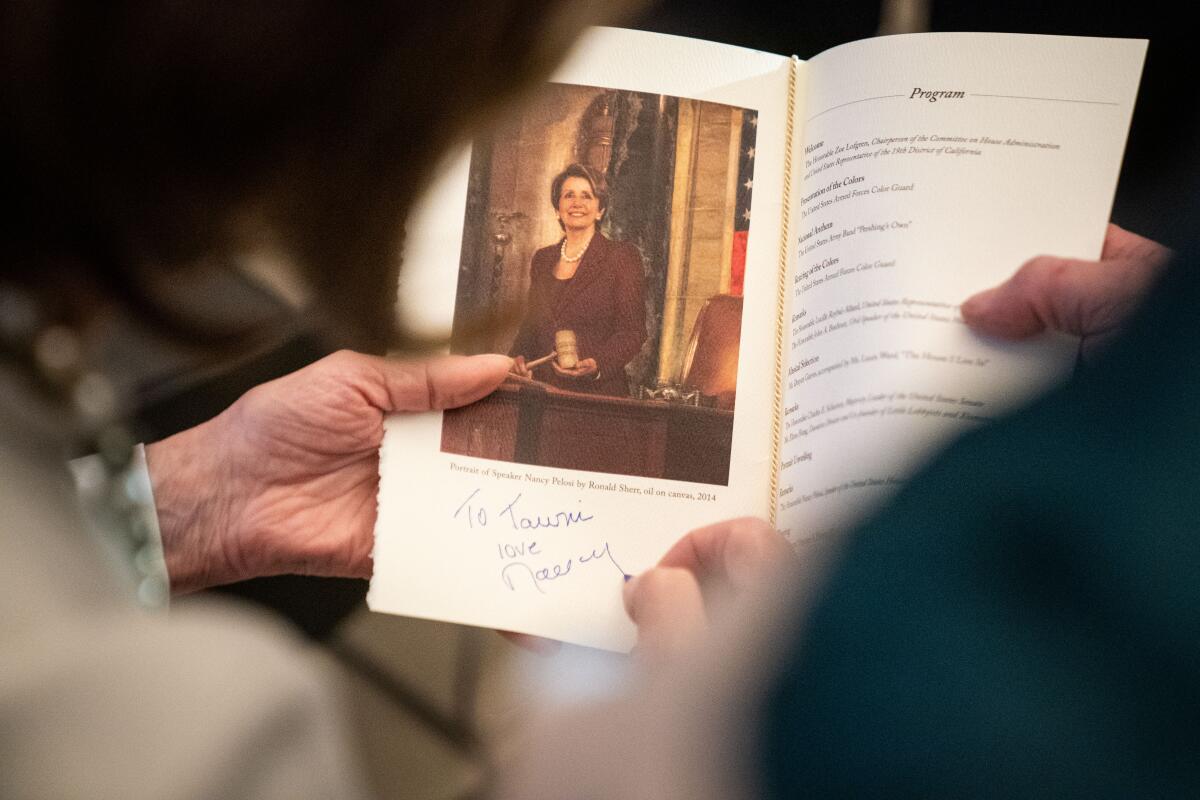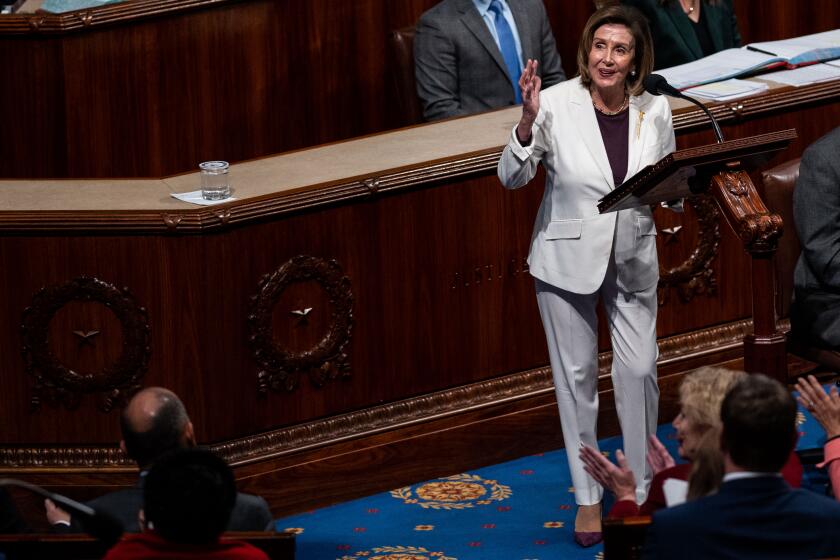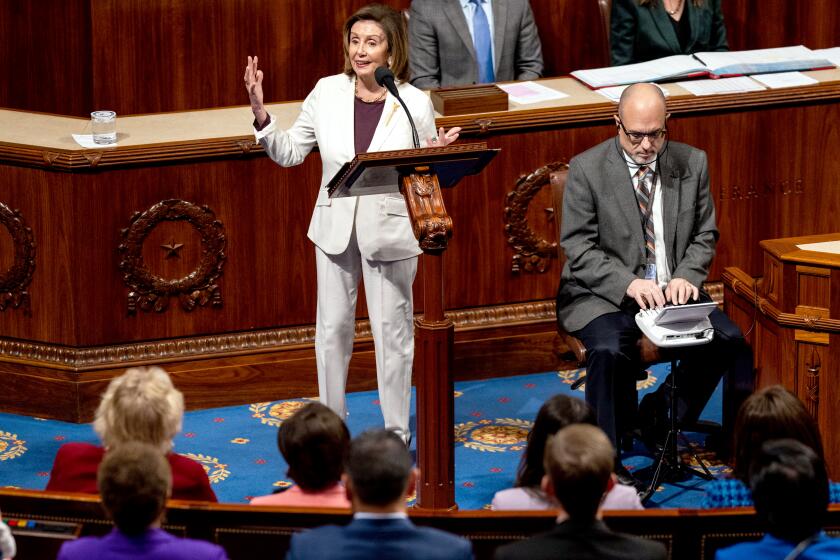Column: Nancy Pelosi’s indelible mark

On the Capitol’s most historic man cave, as on much else, Nancy Pelosi has left her mark.
In her final weeks as the nation’s first female House speaker, a reflective Pelosi has been hosting small groups in a ground-floor hideaway tucked in a narrow hall off the beaten path, between two well-traveled corridors. It’s the Board of Education room — the name is an insiders’ joke dating to Prohibition, when “Cactus Jack” Garner, the House speaker from Texas, retreated there with favored buddies for after-hours drinks. Another Texas speaker, Sam Rayburn, renewed the practice through the 1940s and 1950s; Vice President Harry Truman, a former senator, was in the Board of Education room when he got word that President Franklin Roosevelt had died.
It was men only, of course, because that pretty much described Congress in those decades: Women were 1% to 3% of the membership.
“They’d say they’re going to the Education Committee, but of course it meant they were coming down here to play cards and enjoy whatever refreshments that they were enjoying,” Pelosi told me and several other female journalists she’d invited for an alcohol-free lunch.
Opinion Columnist
Jackie Calmes
Jackie Calmes brings a critical eye to the national political scene. She has decades of experience covering the White House and Congress.
The history-maker revelled in the history of the room. Pelosi pointed to the state seal of Texas painted high on one wall — harking to her predecessors — and to a rendering of the pre-Civil War Capitol, without its later, larger dome, on the opposite wall. (Gone is a portrait of Robert E. Lee.) Then she turned to her additions: two fresco-like paintings, one of her hometown San Francisco’s Golden Gate Bridge and the other a scene of white-clad suffragettes marching outside the Capitol in 1919, when Congress passed the 19th Amendment giving women the right to vote.
One can only imagine what Cactus Jack and Mr. Sam would think of this woman’s touch in their old clubhouse. But over the 80-minute lunch, during which Pelosi did much of the talking, she made it plain she’s been acting throughout her barrier-breaking career with little regard for what high-ranking men think.
Even now she says she feels occasional sexism: “A thousand nicks a day, even though people may not realize it or intend it.” Looking back, Pelosi recalled scraps with both the male hierarchy of the Catholic Church — her church — over gay rights, abortion, contraception and in vitro fertilization (“Poor souls,” she said), and with the men of the House, once resistant to her rise (“Poor babies”).
It was a woman, San Francisco Rep. Sala Burton, who pushed Pelosi, then a fundraiser and organizer in Democratic politics and mother of five grown children, to run for the House. Burton was dying of cancer when she tapped Pelosi to take her seat: “A woman asking another woman, which was highly unusual,” Pelosi said.
Even Republicans have marveled at Pelosi’s prowess in achieving landmark legislation on healthcare, civil and human rights, environmental advances, economic opportunity and more.
“I never intended to run for Congress. Never,” she said, and added, “I never intended to run for leadership.”
But as Pelosi worked to elect more women and raised gobs of California money for Democrats, women and some men urged her to run, first for minority whip, in 2001. There was, however, a pecking order in the male-dominated institution: “The guys said, ‘Who said she could run?’ ”
She mimicked an exchange of the time:
“Why don’t the women just make a list of the things they’d like to see done and give us the list?”
“Oh, really? Why don’t you make a list?”
“Well, it’s not the time [for a woman in the leadership].”
“No? We’ve been waiting over 200 years.”
Still, she said, “I never thought that we would have a woman speaker. I thought, ‘The country is so much more ready for a woman president than these guys are ready for a woman speaker.’ ”
When Pelosi arrived in Washington in 1987, the 435-member House included just 23 women, roughly split between the parties. “I would never have been speaker if there hadn’t been many more women members,” Pelosi said. Now the number is 122, three-fourths of them Democrats.
Clear-eyed and unsentimental, with a nod to women’s political empowerment, Democratic House Speaker Nancy Pelosi showed the skills that make her a historic figure.
Among her most formidable challenges over two decades as House Democratic whip, leader and speaker: contending with the Catholic hierarchy. She counts as her “biggest disappointment, the closest I ever came to tears,” the church’s lobbying to kill the Affordable Care Act — the law Pelosi considers her most important achievement — because the bishops opposed its coverage for contraception.
She said she’d made her case to church emissaries “as a devout practicing Catholic,” only to be told, “You’re not that devout.”
“Thank God for the nuns,” Pelosi said, describing them as “fabulous,” “aggressive” and “outspoken” in support of contraception coverage and of the healthcare law.
She and the American bishops battled for years over abortion rights. “I had five children in six years and one week. That’s a lovely thing for me. That should not be the standard I set for anybody else,” Pelosi said. “This is none of anybody’s business. It’s a woman’s right to make her own choices with her family, her God, her doctor.”
Asked if she had any regrets over her 35 years in Congress, she quickly replied no.
Nothing? “No. Nothing.”
But she does have stories to tell. Pelosi said she would probably write a memoir “because I’ve got to set the record straight about certain things.”
As a backbencher in the new Congress starting in January, she should have more time to begin that project. As the leader emerita, perhaps she could make the Board of Education her writing room.
More to Read
A cure for the common opinion
Get thought-provoking perspectives with our weekly newsletter.
You may occasionally receive promotional content from the Los Angeles Times.














